 Leading Blog | Posts by Month |
 Leading Blog | Posts by Month |
12.31.15

LeadershipNow 140: December 2015 Compilation
See more on
Posted by Michael McKinney at 12:16 PM
12.30.15

Leadership Lessons from the Wright Brothers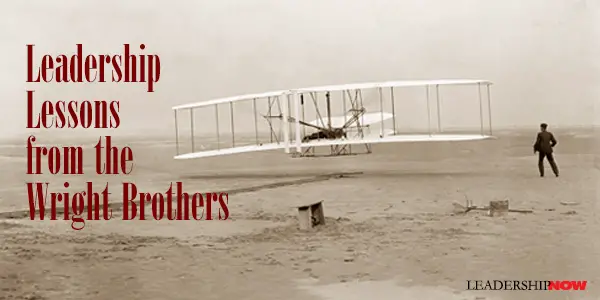
THE WRIGHT BROTHERS were born into an exciting period of American history. A time of great progress. Life-changing progress.
Their story provides us with many lessons for leaders. It’s a story of the possibilities that show themselves when we approach life from the right perspective. Courage
Determination
Life-Long Learning
Communication
Teamwork
Character

Posted by Michael McKinney at 08:49 PM
12.25.15

The Best Leadership Books of 2015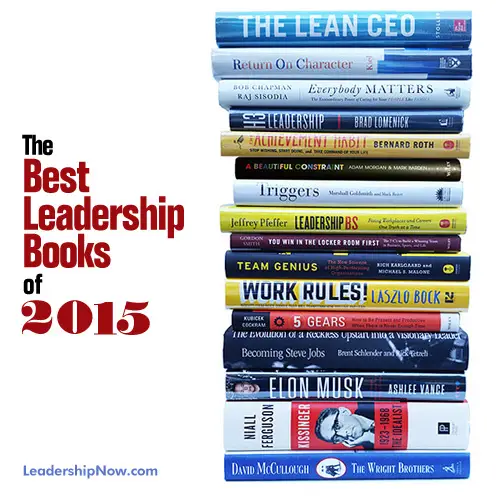
AS LEADERS it’s easy to get caught up in the moment. It’s hard to take the long-term view when we have to do the mundane. Learning to take the longer view is not easy. A long-term approach helps to take us out of our comfort zones because it connects us with a larger story. How in the midst of the mundane, the glut of information, and the tyranny of the now, can we remember that we are part of a larger—very human—story? From Everybody Matters which helps us to look at those we lead as family to Becoming Steve Jobs that looks at the development of a leader as a life-long process, the following books help us to do just that. Lead the larger story. by Jacob Stoller Lean is not just a manufacturing system. It is a way of thinking about people that applies to any organization. Lean is a culture. It’s not a directive. It’s a way of thinking. It is about being open and humble. It’s about diversity of thought and understanding that good ideas come from anywhere. The Lean CEO gets to the heart of what it means to lead from anywhere. (Blog Post) by Fred Kiel In Return on Character, Fred Kiel has put numbers to the notion that good leadership aimed at promoting the common good, not just individual, winner-take-all acquisition can be good business. (Blog Post) by Bob Chapman and Raj Sisodia Bob Chapman and Raj Sisodia tell how Barry-Wehmiller envisioned and implemented a new kind of business culture—a culture that puts people first and cares for employees like family—and turned it into years of highly profitable growth in a tough market. (Blog Post) by Brad Lomenick Brad Lomenick reflects on his leadership journey in H3 Leadership. Building on three H’s— Humble (Who am I?), Hungry (Where do I want to go?), and Hustle (How will I get there)—he gives us 20 habits to build our leadership on. The result is a very practical and challenging guidebook. (Blog Post) by Bernard Roth The Achievement Habit is a book about life. Bernard Roth has woven together wide variety of insights to help us to design our life and leadership. Using design thinking we can transform our behavior and relationships. Stop wishing, start doing, and take command of your life with the ideas presented here. (Blog Post) by Adam Morgan and Mark Barden Typically we look at a constraint as a negative. A problem to be solved. But what if a constraint was the gift that opened up previously unimagined possibilities? What if a constraint was the gift that took you to the next level? We can choose to use a constraint as an impetus to explore something new and arrive at a breakthrough. Not in spite of the constraint, but because of it. (Blog Post) by Marshall Goldsmith with Mark Reiter Marshall Goldsmith explains in Triggers the kinds of things in our environment that derail us from becoming the kind of leader, co-worker, parent, or spouse that we want to be. He illuminates an aspect of self-awareness that is so vital to a leader’s success. By creating an awareness of our environment and identifying our own triggers we can be a force for adding value in other people’s lives by triggering something good in others. (Blog Post) by Jeffrey Pfeffer Leadership BS is a compendium of human nature. It describes well the hypocrisy in all of us. We don’t always meet our own standards. We don’t always reward what we say we value. The real world doesn’t behave as it should. Leadership BS is an important book because it is a dose of reality. It is important for the questions it raises. (Blog Post) by Jon Gordon and Mike Smith Jon Gordon and NFL coach Mike Smith describe how to transform a mediocre team into a winning one. You Win in the Locker Room First provides leaders of all fields with a practical framework and real world examples to build a great culture, lead with the right mindset and approach, create strong relationships, improve teamwork, execute at a higher level, and avoid the pitfalls that sabotage far too many leaders and organizations. by Rich Karlgaard and Michael S. Malone “Teams are not strictly practical responses to immediate challenges and situations. Teams are at the heart of what it means to be human,” write Rich Karlgaard and Michael S. Malone. This book brings together both the best practices of today and the past, with the latest scientific research, to show leaders in every field how to build the dynamic, robust, and great teams they will need in order to compete in this new world. by Laszlo Bock Laszlo Bock shares how Google does it. Frequently unconventional, the ideas do resonate and beg to be tried in your organization. How does Google balance creativity and structure? If you’re comfortable with the amount of freedom you’ve given your employees, says Bock, you haven’t gone far enough. by Jeremie Kubicek and Steve Cockram “Every day, millions of people are negatively impacted by the inability of a person to connect appropriately and to be present.” So much drama is created when we don’t know how to shift gears and become present. 5 Gears offers an extremely valuable metaphor for identifying which gear you are in and finding the right gear at the right time in order to connect fully with others. The 5 Gears model gives you language to communicate which gear you are in to yourself and others, and to understand where others are at so that you can be more fully present. (Blog Post) Biographies: by Brent Schlender and Rick Tetzeli Becoming Steve Jobs looks at Jobs as a work in progress. “Steve is a great object lesson in someone who masterfully improved his ability to make better use of his strengths and to effectively mitigate those aspects of his personality that got in the way of those strengths.” And we can too. by Ashlee Vance Elon Musk is one of the most successful and important entrepreneurs in the world. Vance has written a fair portrait of Musk so far. That Musk is extremely persistent is clearly seen. At the same time he is very hard to work with. Comparisons with Steve Jobs are not off the mark. by Niall Ferguson Kissinger: 1923-1968 is the first volume in a two-volume biography. He was one of the most important foreign policy theorists and secretaries of state that America ever produced. Whether you agree with Kissinger or not, Ferguson provides interesting insights into the man and his thinking. by David McCullough The Wright brothers were more than just a couple of bicycle mechanics. They were convicted, determined and communicated well. They were a model of authenticity. They were basically self-taught with a well developed love of reading. Their character made their success very likely. Related Interest:
Posted by Michael McKinney at 02:54 AM
12.22.15

7 Coaching Skills that You Need as a Leader
Whether you like it or not – if you are a leader, you are a coach.Coaching exerts enormous leverage. People struggle at work and at home. No one leaves their problems at the door when they come to work. And it affects their performance. Coaching is critical. Developing people is or should be a top priority of leaders. Coaching doesn’t mean fixing people. It is developing a relationship that allows you to help people break through from one level of performance to another. It is unlocking potential. Michael Simpson writes in Unlocking Potential that coaching is built on four principles: Building Trust: “Simply being in a position of authority does not make you a trusted coach. Your concern for the person you are coaching must be based on genuine and good intent. Your integrity must be inviolable. Your determination to keep confidences must be unshakable.” These are issues of your character. Tapping Potential: “When a coach helps a person challenge their paradigms, they can more readily take responsibility for their life or situation. When they learn to align their paradigms to reality, many of the barriers to realizing their potential begin to fall.” “Potential suppressed by years of self-defensiveness, self-betrayal, or self-denial.” Creating Commitment: You can’t make people commit, “But you can create the conditions where people commit to goals they themselves want to achieve.” This is done primarily by asking powerful coaching questions. Executing Goals: “All successful coaching conversations need to link directly to actually meeting key performance indicators, measures, and objectives.” Coaching is a skill with its own set of competencies. Simpson gives seven:
Simpson provides you with the essential questions and approach behind each of these skills. One of the benefits of coaching is that it also helps you to develop you. It holds you to a higher standard.   
Posted by Michael McKinney at 08:33 PM
12.11.15

Are You Trading Influence for Attention?
PEGGY NOONAN brought up some great thoughts in her editorial, A Rash Leader in a Grave Time that would be good for us to consider in any time. She was referring to the presidential campaign of Donald Trump, but too frequently we see the tendency of leaders in all walks of life, to use their “mouth as a blunt instrument” whenever they feel they are in the right, have a just cause, want to get attention, or simply want to put their foot down. Their comments may not be as flamboyant as Donald Trump’s, but they are just as dismissive. Some people find that to be an admirable quality in a leader, until of course, they don’t. When the leader steps on their toes, then the undisciplined rhetoric comes across as contemptuous. Noonan says that the problem arises when a leader “doesn’t think it through, doesn’t anticipate legitimate pushback, doesn’t try to persuade, only declares.” It is disrespectful and shows a lack of self- and situational-awareness on the part of the leader. 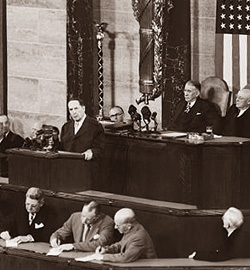 She uses the word politesse in this regard. In a time when grabbing attention is more important than civility, politesse it not a practical value. Taking the time to be civil or polite and to polish our words is a luxury we can’t afford or we may miss adding our voice to what’s trending. The pressure to respond doesn’t often leave us the time to be thoughtful, measured, and disciplined on our approach. We have to fight the forces that would intimidate us. That doesn’t mean we can’t be remarkable in our speech. Noonan encourages, “It is possible for candidates to be vivid but careful, dramatic but responsible.” Politesse is a word that implies sacrifice which is at the core of good leadership. Sometimes we have to sacrifice our raw emotions for disciplined thought; our efficient bluntness for long-term understanding.
Posted by Michael McKinney at 03:11 PM
12.08.15

5 Leadership Lessons: Players First His Players First philosophy is summed up this way: “I coach for the names on the backs of the jerseys—not just the front. My players. They are sent to me by their fathers, their mothers, their grandmothers, their aunts—whoever in this world raised them and loves them. Others look at their NBA bodies and consider them lucky. Future millionaires, just stopping through before they cash in. That’s not what I see. They’re kids, some of them as young as seventeen years old. They all need me in a different way. Some want my affection, others my approval. It’s a burden to be responsible for other people’s children, sometimes a heavy burden.” From this mindset comes this key point that any leader could ask. “If I’m struggling with a player, it’s where I ask myself: How would I want my own son treated?” These ideas are worth considering in your own leadership situation: You have to be strong willed. You can’t have a mental picture of yourself that’s not accurate. Along the same lines is this note sent to a player: Alex, work hard to improve your body language. Body language is a facial expression, slouching, dropping your head, how you sand, how you sit, how you speak. Begin today. God created you as a winner and he has big plans for you. Work with him. Be the best. When you feel like you want to drop your head, lift it up. When you feel like slouching your body, stand up straight. When you want to frown or have a sour face, smile. When you feel like complaining, encourage someone else. When someone corrects you, thank God because they care. 
Posted by Michael McKinney at 10:58 PM
12.04.15

The Gift that Keeps on Giving
LEADERSHIP is stewardship. It requires a long term perspective. It is difficult because it is fundamentally a process of reconciliation; a process of bringing a community of people together towards a common purpose. It is service. Stewardship requires that the organizational leaders put leadership in the hands of every member of the organization. It gives them ownership of the future. As leaders, it is where we can contribute the most good for society as a whole. It’s good stewardship. In Bob Chapman and Raj Sisodia’s remarkable book, Everybody Matters, they explain the idea this way: So many American businesses destroy lives every day, but we make a lot of money, and then we feel really good when we write a check to the United Way for $1 million. But I believe we are creating the need for the United Way in the first place by destroying the lives of people who create the wealth that enable us to give. I believe the greatest charity is what we could do at work every day to take care of the people entrusted to us. As a leader, ask everyone you influence, “How can I serve you?” 
Posted by Michael McKinney at 02:52 PM
12.02.15

How the World’s Best Leaders Enhance Their Productivity and Effectiveness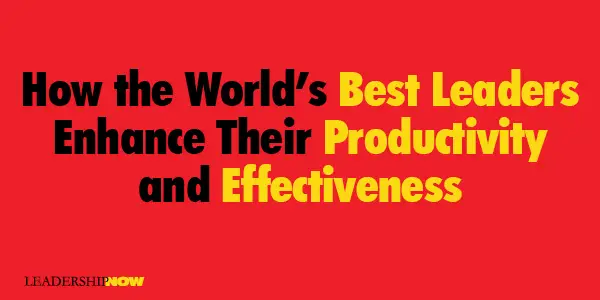
 Leaders know how to choose the right person for the job. As Jim Collins wrote in his book Good to Great, leaders start by getting the right people on the bus and in the right seats. In my book The CEO’s Secret Weapon: How Great Leaders and Their Assistants Maximize Productivity and Effectiveness, I interviewed global business leaders such as Richard Branson, Donald Trump, Steve Forbes, John Chambers, and others, who repeatedly demonstrated this knack of hiring the right person who could operate as a seamless extension of the executive. In the case of these business leaders, all their assistants have been with them well over 20 years, and sometimes, over 30 years. Donald Trump told me, “I have good instincts but I always believe every hire is a gamble.” Knowing yourself, your work habits and your work style are key. In discussing hiring his assistant, Norma Foerderer, who was with him over 25 years before she retired, Trump told me, “I needed someone strong because I work quickly and am demanding because of that. I also needed a straight shooter—someone who will tell it like it is. I’m that way and I can’t have someone who isn’t. Every boss appreciates someone who is honest with them.” So, how do these global business icons manage to get so much done through the smart use of their assistants? Here are some suggestions for how can you do the same in your business: Give Them Access: Give your assistant complete access to you. Let them learn by observing your decision-making process, your moods, why you like or dislike something. This perspective will give them a compass for how to act on your behalf. Confident of what you would want, they won’t hesitate to act as your proxy. Give Them Autonomy: Great leaders know when to become immersed in the details and when they should let someone else take the lead. If you’ve hired the right person, let them do their job. Trust them. Don’t second-guess what they do. As General Patton reportedly said, “Never tell people how to do things. Tell them what to do and they will surprise you with their ingenuity.” In the case of exceptional executive assistants, you don’t even need to do that. Simply share your vision with them and trust their experience, skills, and creativity to take it from there. Give Them Confidence: When you trust people, you build their confidence and encourage initiative. I was fortunate in my positions as assistant to successful business leaders such as peak performance strategist, Tony Robbins, to be allowed considerable latitude in how I did my job. Then the job becomes exciting because you care for it and run it as you would your own business. Richard Branson’s former assistant, Penni Pike, told me that after many years of working in close quarters with Branson, one day he told her to take all his most important papers and move back to the houseboat from where they worked earlier. She said that while it felt strange to be away from him in the beginning, it came to feel like she was running her own business. In fact, the experience I gained through being trusted by my bosses and working independently, gave me considerable confidence when I started my own business because decision making and going out on a limb were not new to me. Give Them Kudos: Management consultant Peter Drucker told me he didn’t have much interest in discussing assistants with me because his focus was on strategy and assistants don’t create strategy. If he were alive today, I think Mr. Drucker would be pleasantly surprised to see the role many assistants are playing in helping their executives define strategy because of the strategic position an assistant to a leader occupies in an organization. The assistant is often privy to information that would never make it to the ears of the CEO unless the assistant told them. Who is doing or saying what, how employees are reacting to new directives, much of this is communicated to the CEO by their assistant, whose finger is on the pulse of the organization. Smart leaders take note of their assistant’s recommendations. Management guru Marshall Goldsmith commented in my book, “Executives should get in the habit of asking their assistants, ‘How can I be a better partner in our relationship’, then listen, learn and act on the assistant’s ideas.” Give Them Respect: Every top influential business leader I’ve had the privilege of knowing or hearing about, shows courtesy and consideration to their assistant – in public and private. They don’t disrespect their assistant and they don’t let others disrespect their assistant. I remember, as a young assistant, telling my CEO boss that someone had been rude to me. My boss immediately called him saying that when I called, this person needed to speak to me as if he were speaking to my boss. That experience taught me that a boss backs up his people. As much as the assistant “has the boss’ back”, the boss should do the same. Give Them Gratitude: Acknowledge the immense job your assistant is doing on your behalf. Time after time, great business leaders have told me they could never do what they do without their assistant. As Ken Blanchard remarked in my book, “Assistants give you the capacity to do so much more.” Remember to express your thanks, show consideration and once in a while, look for ways to reward them. Develop these habits and you will have learned some of the secrets that for generations have enabled exceptional leaders to function at optimum levels, working effectively with their exceptional assistants. Jan Jones is the author of The CEO’s Secret Weapon: How Great Leaders and Their Assistants Maximize Productivity and Effectiveness. She is President of Jan Jones Worldwide, a speakers bureau that evolved from her experience as executive assistant to personal development icon, Tony Robbins and ten years as exclusive representative for small business visionary, Michael Gerber. For more information: theceossecretweapon.com  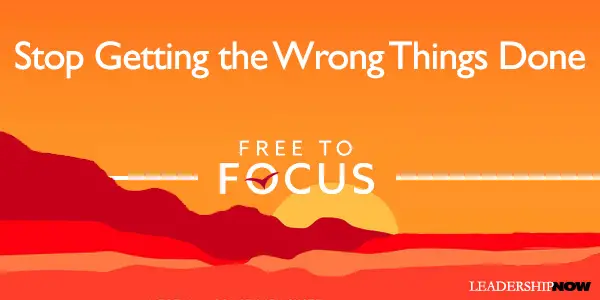 
Posted by Michael McKinney at 09:24 AM
12.01.15

First Look: Leadership Books for December 2015Here's a look at some of the best leadership books to be released in December.




For bulk orders call 1-800-423-8273  Build your leadership library with these specials on over 100 titles. All titles are at least 40% off the list price and are available only in limited quantities. “A capacity and taste for reading gives access to whatever has already been discovered by others.” — Abraham Lincoln
Posted by Michael McKinney at 10:33 PM
|
BUILD YOUR KNOWLEDGE


How to Do Your Start-Up Right STRAIGHT TALK FOR START-UPS 
Grow Your Leadership Skills NEW AND UPCOMING LEADERSHIP BOOKS 
Leadership Minute BITE-SIZE CONCEPTS YOU CAN CHEW ON 
Classic Leadership Books BOOKS TO READ BEFORE YOU LEAD |
|